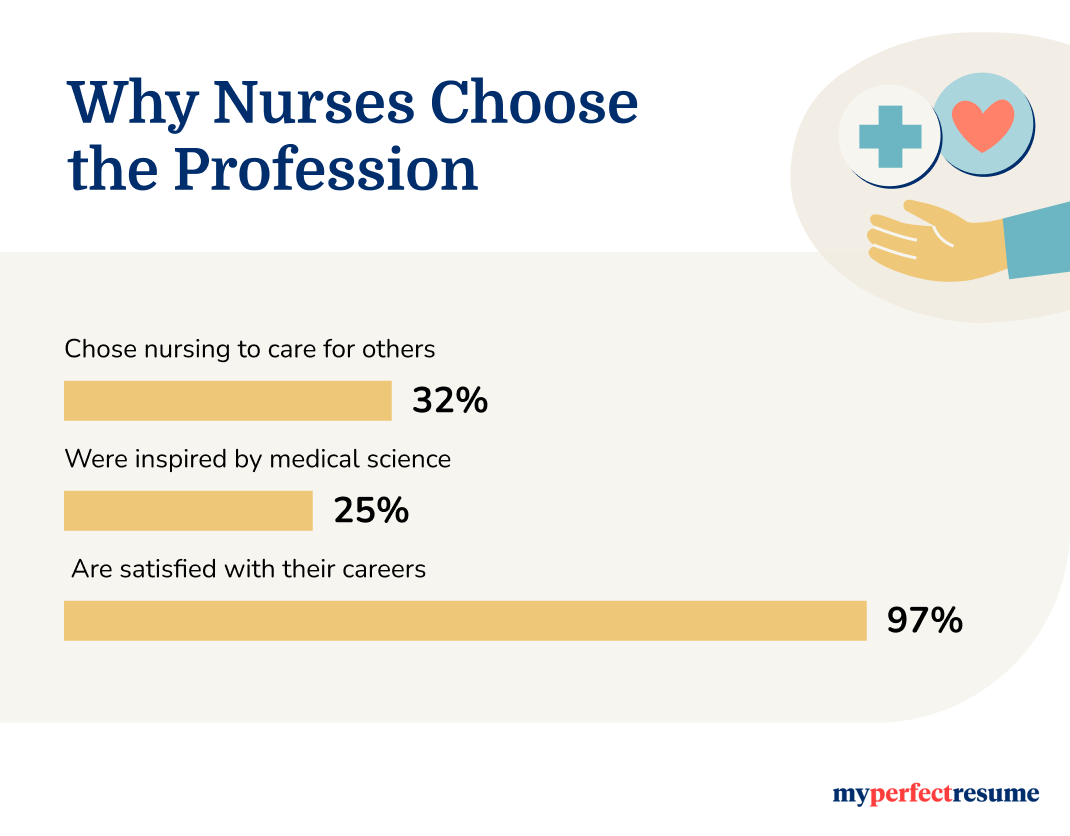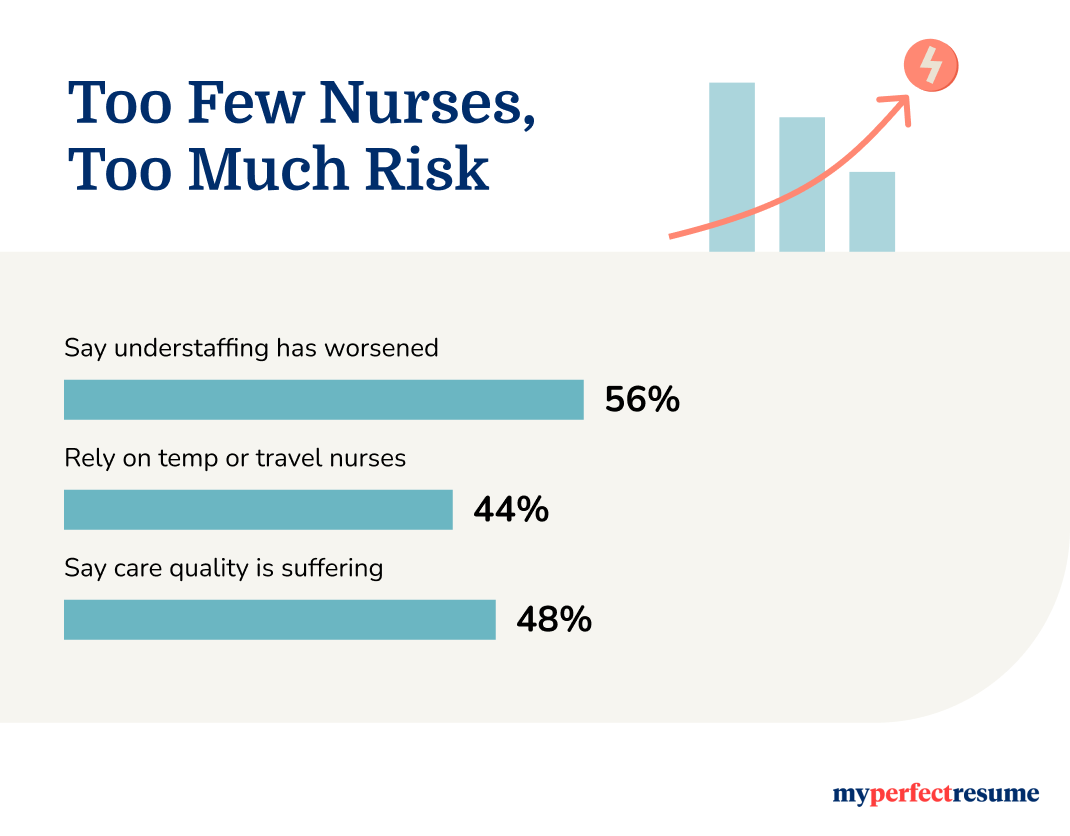Our customers have been hired at: *Foot Note
Table of Contents
Get started with MyPerfectResume today!
- Build a resume on any device
- Pick an ATS-friendly template
- Tailor with AI copy suggestions
A recent survey from MyPerfectResume uncovers a growing crisis in the nursing profession: 96% of nurses have considered leaving their roles.
At the same time, 94% say they would still choose the profession again, showing that while the passion is strong, the profession is in trouble.
The survey, which gathered insights from nearly 900 U.S. nurses, paints a picture of dedication colliding with burnout, inadequate staffing, and emotional strain.
While 97% of nurses report some level of career satisfaction, most also work unpaid hours, manage side gigs, and deal with conditions that compromise patient care.
Key findings:
- 96% have seriously considered leaving the profession
- 83% feel burned out at least weekly
- 9 in 10 have seen increased turnover at their workplace
- 56% say understaffing has worsened
- 48% say care quality suffers due to staff shortages
- 92% supplement their income with extra work
Nursing Passion Persists — But Support Is Lacking
Nurses are not in it for the paycheck alone. Many enter the field for deeply personal reasons:
- 32% chose nursing out of a passion for helping and caring for patients
- 25% were drawn to medical science and patient care
- 52% say they are very satisfied with their career
- 45% say they are somewhat satisfied
Here’s a visualization of the data from above:
What this means: Nurses remain committed to care, but commitment alone can’t offset the toll of unsupported, high-pressure environments.
Burnout Is the Norm, Not the Exception
Burnout is not an isolated issue — it’s systemic:
- 47% feel burned out a few times a week
- 36% feel burned out every shift
- 63% say their employer has attempted to address burnout
- 1 in 3 say those efforts have been ineffective
Top causes of nurse burnout:
- 37% cite lack of mental health support
- 36% point to safety concerns
- 34% blame long shifts and mandatory overtime
What this means: While employers may be trying to address burnout, solutions often fall short. The emotional and physical toll of nursing is overwhelming for a dedicated workforce.
Why Nurses Are Considering Leaving
Nurses are not walking away because of a lack of dedication. They’re walking away because of systemic failures:
- 30% say the workload and long hours are too much
- 28% cite limited career advancement opportunities
- 23% report ongoing emotional strain
- 56% say they’d consider getting new certifications or going back to school to change careers
What this means: Retention efforts must go beyond gratitude. Nurses seek career growth, manageable workloads, and access to mental health resources.
Explore reasons to leave a job if you’re experiencing nurse burnout symptoms and considering transitioning to a new role or field.
Staffing and Safety Are at a Breaking Point
Nurses are increasingly outnumbered, and the impact is showing:
- 56% say their workplace is more understaffed than before
- 44% say their workplace frequently relies on travel or temp nurses
- 48% say patient care quality is significantly impacted by staff shortages
Here’s a visualization of the data from above:
What this means: Staffing challenges don’t just affect employees — they directly affect patient outcomes.
Beyond the Shift: Unpaid Hours and Side Jobs
One of the causes of nurse burnout is that nurses are putting in extra hours and reaching into their wallets just to keep up:
- 59% work 41–45 hours per week
- 47% work an extra 5–10 hours each week off the clock
- 92% take on side jobs or gig work to supplement income
- 18% buy their supplies monthly; 35% do so several times per year
What this means: Nurses are subsidizing a broken system with their time, health, and money. Without reform, these burdens will continue to drive professionals out of the field.
3 Tips To Fight Nurse Burnout
Many nurses report feeling stuck or burned out by their current roles, but are unsure how to make a change.
For those considering new opportunities, career growth, or even a shift within the field, MyPerfectResume offers professionally written nursing resume examples designed to help nurses highlight their strengths, showcase their experience, and take the next step with confidence.
To combat workplace burnout, nurses can try the following:
- Prioritizing self-care and setting boundaries: Nurses can often prioritize patient needs over their own. However, consistent self-care is one of the best measures to prevent burnout. Nurses can ensure they take time for rest, eat healthy meals, and practice mindful exercises like yoga and stretching. Establishing clear boundaries between work and personal time can also help recharge nurses before their next shift.
- Building a support network to supply help: Burnout thrives in times of isolation. Seeking support is essential if any nurse is feeling the signs of stress or burnout. Nurses can ensure they share their experiences with those who can help them, like their supervisor, the Human Resources Department, or workplace counseling services. A strong support system can make all the difference in managing stress and well-being.
- Evaluating workplace culture before taking a new role: Any nurse considering a new position due to workplace stress and burnout should research the new employer to determine how they support a healthy workplace. During interviews, they can ask about work culture, how they provide support when nurses encounter stressful moments or patients, and how they help nurses manage their roles and overall well-being. Choosing a workplace that values nurses' well-being is pivotal to career and patient success.
Survey Methodology
The findings were obtained by surveying 876 U.S. nurses on March 6, 2025. The MTurk survey included a mix of multiple-choice, scale-based, and open-ended questions to assess job satisfaction, burnout, compensation, and systemic challenges in the nursing profession.
MyPerfectResume remains committed to offering data, insights, and tools to help nurses — and all professionals — thrive in meaningful, sustainable careers.
About MyPerfectResume
MyPerfectResume Resume Builder with professional templates is designed to help job seekers elevate their careers. The easy-to-use platform was created to eliminate the hassle of resume writing, offering professionally written examples, free expert tips, step-by-step guidance to make a resume, and valuable interview advice to create an outstanding job application effortlessly. Since 2012, MyPerfectResume's Resume Builder has helped more than 11 million job seekers create their perfect resumes online. Its comprehensive employment surveys have been featured in Forbes, Yahoo! Finance, CNBC, Newsweek, USA Today, BBC, Workable, and more. Stay connected with MyPerfectResume’s latest Facebook, LinkedIn, Instagram, X, and Pinterest updates.
Our customers have been hired at:*Foot Note












